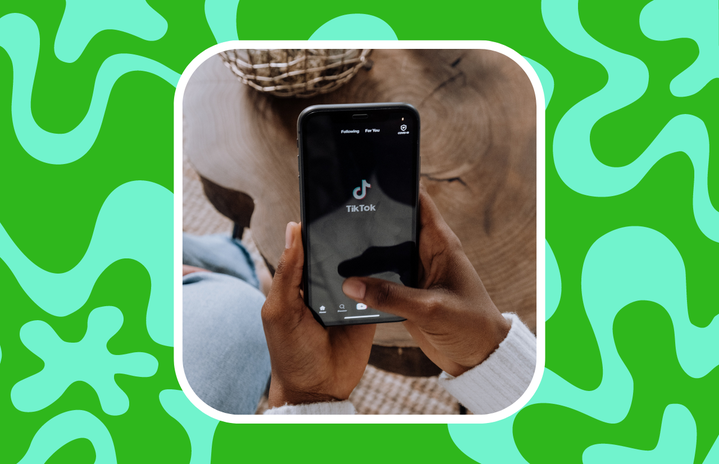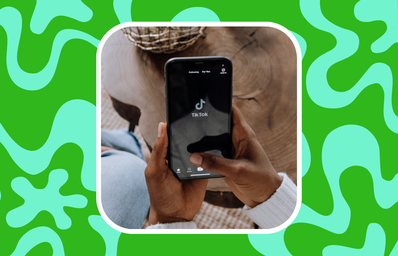POV: It’s 3 a.m., and you’re scrolling through TikTok. A video pops up of a young woman showing her morning routine. She gets up before sunrise to do her multi-step skincare routine and journal. She works out religiously and has a planner that could have come straight from Pinterest. She drinks green juice and only eats organic food. She seems to have everything together.
Soon, countless videos of young women showing you how to be “that girl” appear in your algorithm. Why wouldn’t you want to be her? She’s productive and motivated—the total embodiment of health and success.
When I started seeing these videos, I wanted to be “that girl.” Of course, being reminded to move your body, drink water and cut out toxic relationships; All seems positive. But as I became inundated with impossibly aesthetic videos of Gen Z girls showing their productive morning routines and perfectly toned abs, the insecurity started. As I watched more and more, I felt like I was trapped in a rabbit hole of self-comparison.
It’s easy to forget that what these videos show is not the whole truth. Taking care of yourself and your body is essential, and videos about wellness seem harmless on the surface. But the subtle ways in which toxic wellness culture disguises itself as motivational content can be the catalyst for some dangerous consequences.
“That girl” is an ideal, an invention to curate aesthetically pleasing content and show only the highlights of someone’s day. It’s not surprising that most of these videos centre privileged white women flaunting their skinny and oh-so-fit bodies while holding their lemon water-filled tumblers. For most people, this ideal is simply not possible. It romanticizes hustle culture that glorifies working ourselves beyond our limits.
“A simple inspection would reveal that ‘that girl’ follows the paths of the accepted norms of pretty privilege in society, something which is unattainable for many,” wrote fashion journalist Kruti Kanaskar in an article for Medium.
As these types of videos flood your algorithm, the toxic message that you’re not worthy unless you also look flawless and have a productive and impeccable routine becomes internalized.
“That girl” is just one part of the wellness craze capitalizing on women’s insecurities. With products like Goop’s vagina-scented candles, costing a whopping CA $106, and detox teas clogging up people’s social media feeds, the wellness industry has grown into an empire. In 2020 alone, the wellness economy was valued at US $4.4 trillion.
It goes without saying that most women don’t have extra money to spend on the latest fitness and wellness fads, especially when inflation is making it harder to afford basic necessities. It’s also important to note that rest is rarely depicted as self-care, despite many people working demanding jobs and having other commitments.
But it’s more than our bank accounts that are paying the price. Wellness culture is supposed to make us healthier, but it’s doing the opposite.
Wellness culture and the “that girl” trend connect to diet culture, which can cause detrimental consequences like eating disorders or preoccupation with body image. While being aware of your food intake isn’t inherently bad, it can spiral into problematic behaviour. Videos like routines and “what I eat in a day” can promote giving food a moral value and make individuals believe they need to adopt a strict diet and fitness plan to be “healthy.”
This sort of behaviour is nothing new. The early 2000s was rife with Slimfast diets, Abercrombie models, and problematic comments in popular TV shows and movies like America’s Next Top Model and Love Actually.
The truth is everybody, and every body is different. As Sadhbh O’Sullivan put it in a Refinery 29 article, “The solution is twofold: first, a radical acceptance of the self through the wholehearted embracing of the self and, second, looking beyond the self.”
This might look like getting enough sleep, meditating, being more mindful about social media and surrounding yourself with supportive people who uplift you. It can also be reaching out for help if you need it.
Lorde said it herself in her 2021 song “Mood Ring,” which mocks the expensive fads of wellness culture: “I’m tryna get well from the inside/Plants and celebrity news/All the vitamins I consume.”
There’s nothing wrong with wanting to improve yourself and take care of your body, but let me be clear. It’s okay to sleep in. It’s okay not to eat perfectly healthy all the time. It’s okay to skip workouts and not have flawless skin. Wellness doesn’t come in one shape and size.
I’m officially getting off the “that girl” train.


